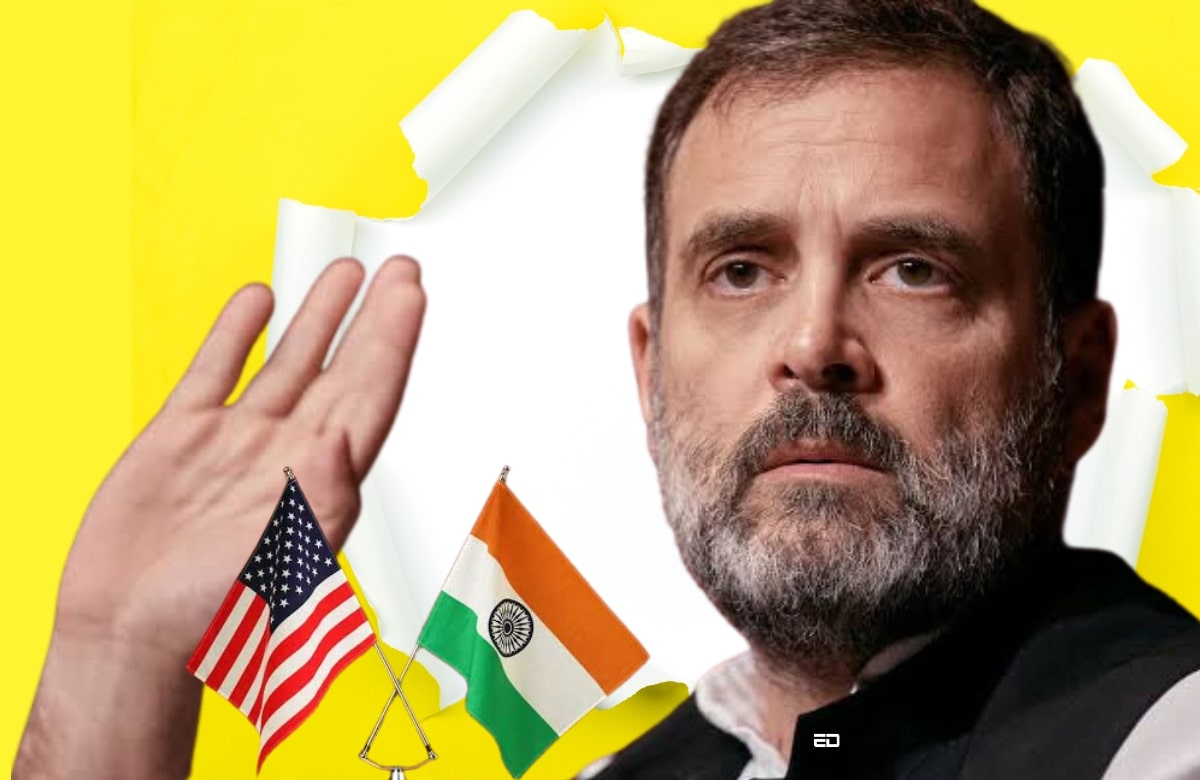Rahul Gandhi who went on an official trip to the United States has been garnering hate over his controversial statements in the country. Well, this is not just the first time.
Recently, during a speech at Cambridge University as well he made certain remarks, which according to a few people, were anti-national, targeted towards one political party, and condemned the core institutions of the nation.

Today, I, along with my blogger friend Katyayani will deliberate on Rahul Gandhi’s statement in the US and answer if these statements are damaging India’s reputation.
No, He Is Not!
Rahul Gandhi’s criticism abroad can showcase India’s robust democracy.
-Katyayani Joshi
Rahul Gandhi, as a political leader and public figure, has the right to express his opinions and criticisms, both domestically and abroad. Freedom of expression is a fundamental right in a democratic society, and it should be upheld and respected. By allowing individuals like Rahul Gandhi to express their views, India demonstrates its commitment to democratic values, including freedom of speech.
Rahul Gandhi’s criticism abroad can showcase India’s robust democracy. It demonstrates that political leaders in India can freely voice their opinions and hold the government accountable for its actions. This openness to criticism and public discourse strengthens the democratic fabric of the country and shows that India values a vibrant and inclusive democratic culture.
Gandhi’s international engagements and criticisms can contribute to global discussions on various issues concerning India. By participating in these debates, he brings attention to important matters such as governance, socio-economic conditions, or human rights concerns. This engagement fosters dialogue and exchange of ideas, leading to a more nuanced understanding of India’s challenges and potential solutions. It also allows for the sharing of best practices and experiences with other countries, which can benefit India’s reputation as an active participant in the global community.
Social Issues and Human Rights
Rahul Gandhi’s criticisms shed light on social issues and human rights concerns within India. By raising awareness about these matters abroad, he draws attention to areas where improvements are needed.
This can contribute to a positive reputation for India by showcasing its willingness to address challenges and work towards ensuring the welfare and rights of its citizens. It can also encourage international cooperation and support in addressing these issues, which can be seen as a responsible and progressive approach.
It is important to acknowledge that political leaders, including Rahul Gandhi, may have differing opinions within a democratic system. Criticism abroad by Rahul Gandhi does not necessarily indicate disunity or lack of support for the country.
It highlights the existence of different viewpoints and the robustness of India’s democratic culture, where individuals can express their dissent or alternative perspectives without compromising the overall unity of the nation.
Rahul Gandhi’s engagement in international platforms allows him to present India’s perspective, clarify misconceptions, and engage in constructive dialogue. By actively participating in global discussions, he contributes to a more balanced understanding of India’s actions, policies, and challenges.
This can help dispel any misinformation or biased narratives, thereby enriching the global discourse on India and contributing to a fairer representation of the country’s complexities.
When individuals criticize leaders abroad, it can bring attention to domestic issues or policies that might have broader implications or international interest. By raising awareness on an international platform, individuals hope to shed light on governance, human rights, or socio-economic conditions that may require attention or improvement. This can lead to international discussions, media coverage, and the engagement of international organizations or governments, which can potentially influence the domestic discourse and bring about change.
Also Read: FlippED: Is Bollywood Also Using Hindutva To Promote Movies Now?
Advocacy and Pressure
Criticism abroad serves as a form of advocacy and pressure on the government to address specific issues. By raising concerns on an international platform, individuals aim to attract attention and support from the global community.
The hope is that increased international scrutiny and pressure can influence the government to take action, especially when there is a perception that domestic mechanisms may be inadequate or unresponsive. This can range from issues such as human rights violations, corruption, or policies that are deemed detrimental to the welfare of the citizens.
Exposing Different Perspectives
Criticism abroad provides an opportunity to present alternative viewpoints and narratives that challenge the dominant narrative or policies promoted by the government. It allows individuals to offer different perspectives to the global audience, fostering a more nuanced understanding of complex issues.
By presenting alternative viewpoints, individuals aim to broaden the discourse, encourage critical thinking, and stimulate dialogue on diverse approaches to governance, social issues, or economic policies. This can help break echo chambers and promote a more inclusive and comprehensive understanding of the country’s challenges.
Yes, He Is!
His remarks not only demean India, but could also result in weakening India’s geopolitical relations.
-Palak Dogra
Rahul Gandhi’s hate towards the Modi-led BJP government is justified, however, it does not allow him to talk badly about the entire nation, his very own India.
Insulting Democratic Institutions
The recently inaugurated parliament has caught everybody’s attention. A slew of opposition parties, including Congress, decided to boycott the inauguration event. However, when Rahul Gandhi went to the US, he mocked how the inauguration unfolded. Not just this, earlier he added that India’s democracy is in danger and hence, nations should interfere in India’s matters.
Demeaning India’s Prime Minister
Having an issue with an opposition political party is one issue, and taking that hatred along to a foreign soil is another issue. Rahul Gandhi made slanderous statements about Narendra Modi on foreign soil forgetting the fact that he is the Prime Minister of India. The political rivalry should stay within the national boundaries, when it crawls outside, national interest and dignity is hurt.
Damaging India’s Growth, Progress
On his US trip, he didn’t have one good thing to say regarding India. That way, on a foreign soil, Rahul Gandhi is just giving the foreign nations a perspective about India which is not in favor of our country. When a nation is insulted by its own people on a foreign land, how can we expect other leaders to think positively about the country?
His remarks not only demean India, but could also result in weakening India’s geopolitical relations which would be harmful for India’s global stature.
Image Credits: Google Images
Sources: Bloggers’ own opinions
Find the blogger: Palak Dogra and Katyayani Joshi
This post is tagged under: rahul gandhi, rahul gandhi in United States, Indian politics, Rahul Gandhi Congress leader, Congress, democracy, Pm Narendra Modi, Narendra Modi, PM Modi, Rahul Gandhi’s remarks
Disclaimer: We do not hold any right, copyright over any of the images used, these have been taken from Google. In case of credits or removal, the owner may kindly mail us.
Other Recommendations:
FlippED: Is Rahul Gandhi Back In The Fray After Bharat Jodo Yatra?

































